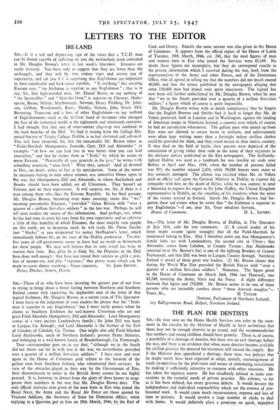THE PLAN FOR DENTISTS
SIR,—In your note on the Home Health Services you refer to the state- ment in the circular by the Minister of Health to local authorities that there may not be enough dentists to go round, and the recommendation that mothers and young children should have priority. There is, of course, a possibility of a shortage of dentists, but there was no real shortage before the war, and there is no evidence that when more dentists become available for civilian practice the demand for treatment will exceed the supply. But if the Minister does apprehend a shortage, there were two policies that he might surely have been expected to adopt, namely, encouragement of ready co-operation by the profession and means of stimulating recruitment by making it sufficiently attractive to compete with other vocations. He has taken the opposite course. He has steadfastly refused to make con- cessions in the essential needs of private practice. His scheme, so far as it has been defined, has many grievous defects. It would destroy the independence and individual responsibility which are the essence of pro- fessional work. It would cause much inconvenience, expense and loss of time to patients. It would involve a large number of clerks to deal with forms. It would definitely place a prerninin,.on quick,. impe#ect. and perhaps undesirable work rather than on more deliberate and careful exercise of operative skill, and thereby lower the general standards of treat- ment. It would perpetuate the proved defects of the present National Health Insurance system of treatment. In-brief, it is both unpracticable and inexpedient. Moreover, it would discourage recruitment ; scholarships and bursaries are broken reeds on which to lean if the potential recipients arc advised that they are proposing to enter a profession in which the conditions of service, quite apart from emoluments, are inherently unsatisfactory.
On the other hand, the profession is entirely in sympathy with the proposed priority for expectant and nursing mothers and young children, but would go much further. It has been pressing for years for improve- ment in these services as well as in the school service. Moreover, it has urged the need for provision for the adolescent period, during which much of the work done in the schools is wasted by more or less enforced neglect. But the Minister has refused to entertain any scheme for adolescents. If he had shown a more catholic spirit he would have had the whole-hearted support of the profession, which, while quite properly watchful to safe- guard its legitimate interests, is fully alive to the needs of the public, and has shown repeatedly during ihe period of progress of dental science and art in the past half-century that its recommendations and actions are not determined by motives of mere self-interest. Unfortunately, the Minister seems to have almost gone out of his way to antagonise the profession. It is important that the public should understand that if a large proportion of the profession decide to exercise their right to stay out of the scheme, because they believe it to be unfair to the profession and injurious to the public, they should not be pilloried as malcontents, but rather that the blame should be placed where it belongs, on the shoulders of the Minister.
57 Harley Street, W. z.



































 Previous page
Previous page